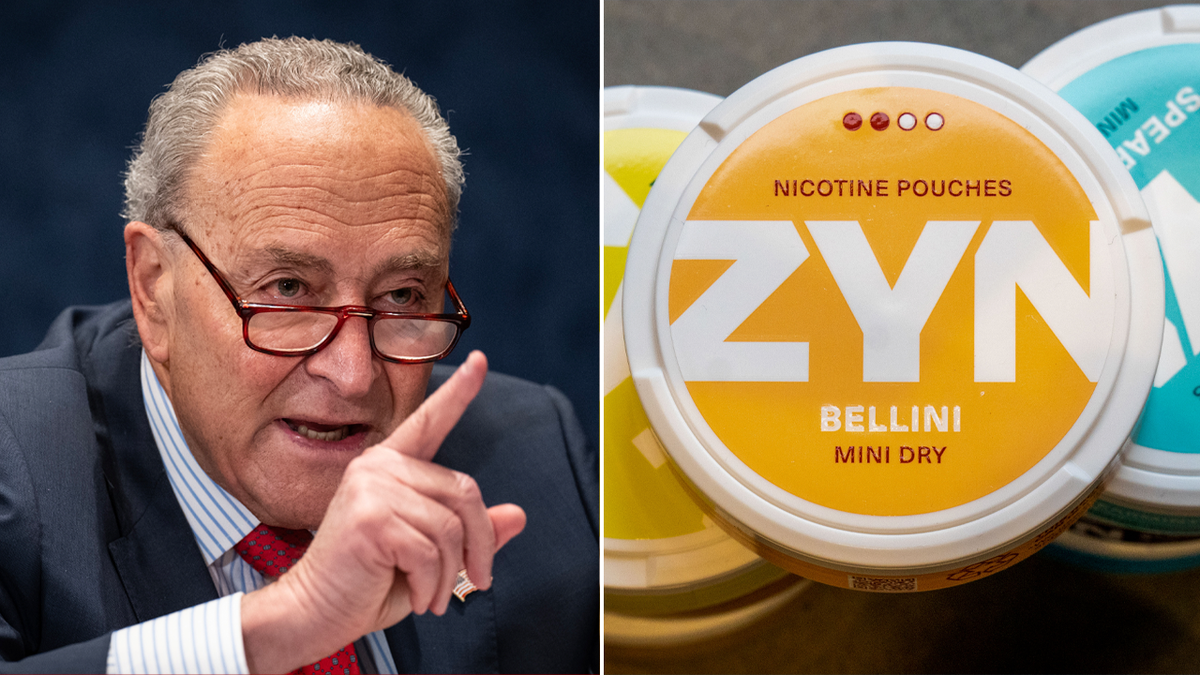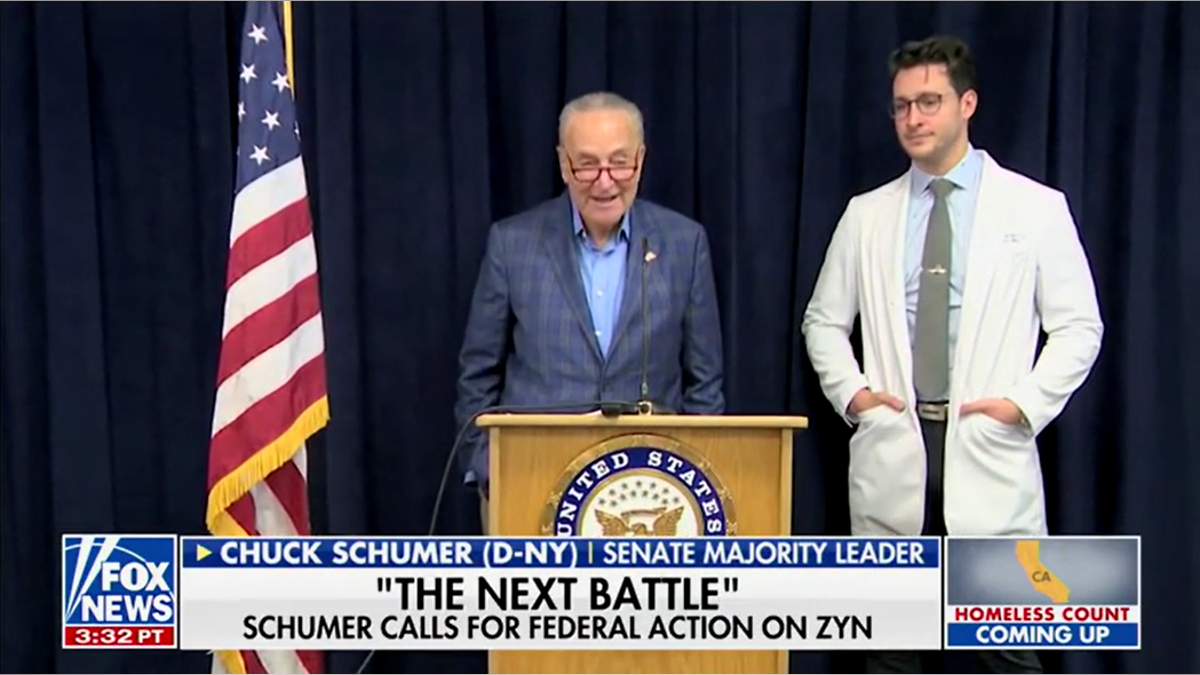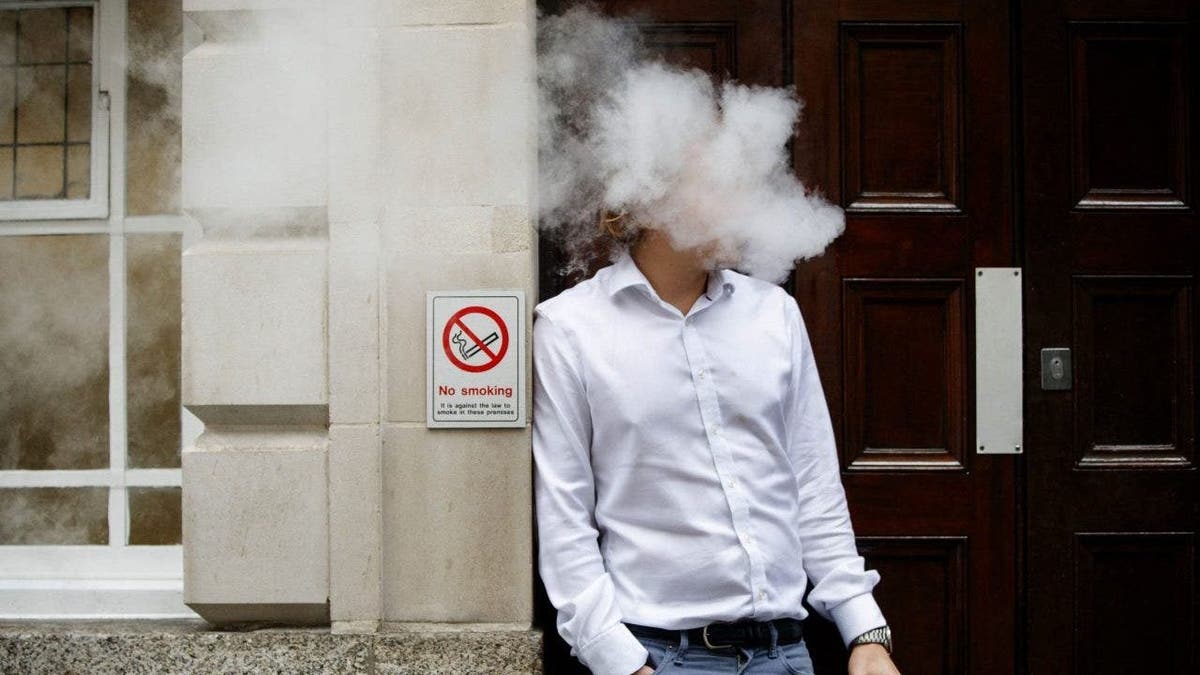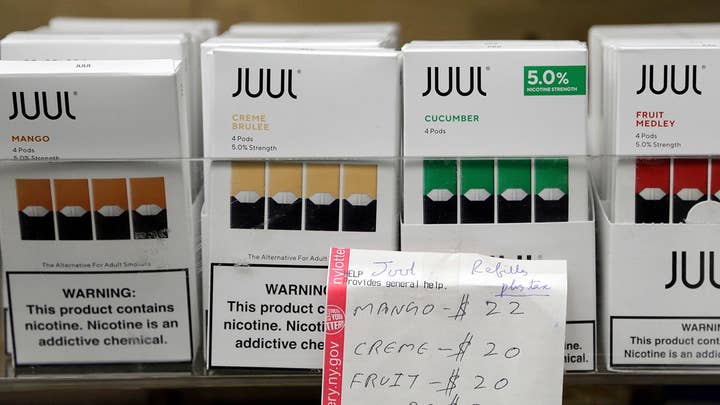Top Democrats call for a federal crackdown on Zyn nicotine pouches
Fox News correspondent Griff Jenkins has more on the push for federal action over the nicotine pouches amid bipartisan backlash on 'Special Report.'
Senate Majority Leader Chuck Schumer, D-N.Y., called for a crackdown on Zyn nicotine pouches Sunday, but experts warned his claims about their dangers risk pushing adult smokers away from a healthier alternative.
While Schumer did not call to ban Zyn nicotine pouches outright, he issued a warning to parents about their popularity and announced he was asking the FTC and the FDA to investigate Zyn for concerns related to marketing and health effects on children.
Schumer condemned the product as "dangerous" and a "pouch packed with problems," saying that "these nicotine pouches seem to lock their sights on young kids, teenagers and even lower and then use social media to hook 'em." The senator argued that Zyn-using social media influences, or "Zynfluencers," are popularizing Zyn usage on social media that can be seen by impressionable young people.
Schumer pointed to the decline of smoking and said tobacco companies have had to shift their focus.

Senate Majority leader Chuck Schumer made headlines after declaring in a public address that he is calling upon government agencies to investigate a company that makes nicotine packets. (Schumer photo by by Drew Angerer/Getty Images. Zyn photo by Jonas Ekblom/Bloomberg via Getty Images)
"The bottom line here is that Big Tobacco has invested a lot of money into an incognito nicotine pouch that’s packed with health problems and seemingly targets kids," Schumer said. "Zyn, owned by Philip Morris, is the market leader in this category, and the feds need to take swift action to get ahead of this nicotine pouch trend before it becomes the next vape crisis."
Board certified family medicine physician Dr. Mike Varshavski, who also spoke at the event, said, "We shouldn’t let the exciting notion of a novel smoking sensation product simultaneously get kids hooked on a new nicotine product."
According to the product’s official website, Zyn pouches are a "smoke-free, spit-free and hands-free" way of consuming nicotine in various flavors by placing the pouch under one’s lip. The site says Zyn is "for adult nicotine consumers 21+ only. We take the issue of underage usage extremely seriously, which is why we require all new visitors to go through a strict age verification process before entering our website."
When Fox News Digital reached out to Zyn, Sam Dashiell, a senior communications specialist for Philip Morris International, replied, "Philip Morris International and its affiliates—including Swedish Match, the manufacturer of ZYN—fully meet and exceed the regulations governing the industry."
Dashiell went on to address Schumer’s concerns about influencers, declaring that their company policy specifically forbids their use.
"Our marketing practices—which prohibit the use of social media influencers—are focused on preventing underage access and set the benchmark for the industry. Real-world evidence shows this approach is working: the latest data from the Centers for Disease Control and Prevention and the FDA show oral nicotine pouch use by those under the legal age remains exceptionally low," the spokesperson said.
Schumer acknowledged the company's claims of not partnering with social media influencers in his letter to the FTC, but pointed to the "eye-popping amount of content" about Zyn on social media, including use by minors.
"I urge your agency to investigate Zyn’s marketing practices, specifically on social media and to seriously consider Zyn’s marketing towards children as part of any investigation," he wrote.

Senate Majority Leader Chuck Schumer held a press conference with Dr. Mikhail "Mike" Varshavski, warning about the growing popularity of Zyn nicotine pouches.
But Guy Bentley, the director of consumer freedom for the Reason Foundation, argued Schumer's crusade is "severely misguided" for attacking a safe, affordable tobacco-free and smoke-free alternative to cigarettes.
"Senator Schumer labels Zyn as a ‘dangerous alternative’ to vaping, but the greater danger is in people mistakenly thinking vaping or nicotine pouches are just as dangerous as smoking. It's one thing to criticize irresponsible people on TikTok, but it's another to whip up a moral panic against products that save lives," he told Fox News Digital.
"FDA must be continually vigilant about youth nicotine use," he emphasized. "Still, politicians and the agency must make clear to the public that just because something contains nicotine, it doesn't mean it's as dangerous as smoking."
"Nicotine, detached from cigarette smoke, is about as risky as caffeine," Bentley said, pointing to its benefits for adults. "Nicotine pouches are a substantial benefit to public health because they help adult smokers quit cigarettes, which are responsible for almost 500,000 deaths per year. Senator Schumer is right to point to the rapid decline of smoking in recent years, but a major reason for this decline is precisely because smokers are switching to safer nicotine alternatives like Zyn."
He then addressed Schumer’s concerns about so-called "Zynfluencers," saying, "Social media influencers should never knowingly promote adult products to youth, but manufacturers should also not be blamed for the actions of people outside of their control."

A smoker is engulfed by vapors as he smokes an electronic vaping machine in central London. (Photo by TOLGA AKMEN/AFP via Getty Images)
BIDEN'S FDA CLEARS PATH FOR CHINESE PRODUCTS TO FLOOD US TOBACCO, NICOTINE MARKET
Dr. Jeffrey A. Singer, a general surgeon and senior fellow at the Cato Institute, wrote a piece responding to Schumer’s address as a textbook case of what he called "Nicotinophobia," or the irrational fear of nicotine.
He made a similar case to Bentley that nicotine by itself is a "relatively harmless drug" that is "similar to caffeine, which can also addict people." He also cited research indicating that nicotine can "treat depression, Tourette’s Syndrome, Alzheimer’s’ Disease, and schizophrenia."
"Nicotine is the addictive component of tobacco smoke," he wrote. "But the tars and other components of tobacco smoke are what cause cancer, cardiovascular disease, and lung disease."
When contacted by Fox News Digital, Singer made clear he is not arguing for young people to have access to nicotine, but argued that "laws should not prohibit adults from consuming substances or engaging in activities simply because they are dangerous or harmful if children do them."
CLICK HERE TO GET THE FOX NEWS APP
"I think the makers of Zyn and other nicotine delivery systems should not market their products to minors. However, Senator Schumer's hyperbolic description of nicotine as ‘dangerous,’ ‘highly addictive,’ and ‘packed with health problems’ mislead the public into lumping nicotine in with the more potentially dangerous drugs that the Drug Enforcement Administration currently classifies as Schedule I. Stoking public fears in this way can lead them and their political representatives to make poor policy choices," he added.











































